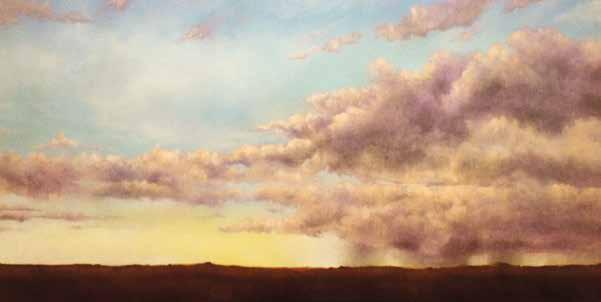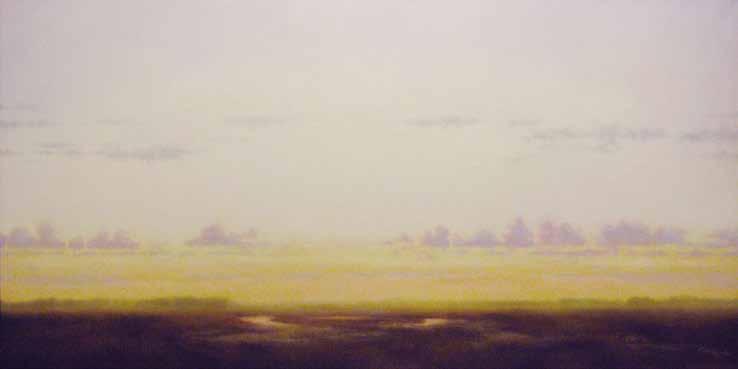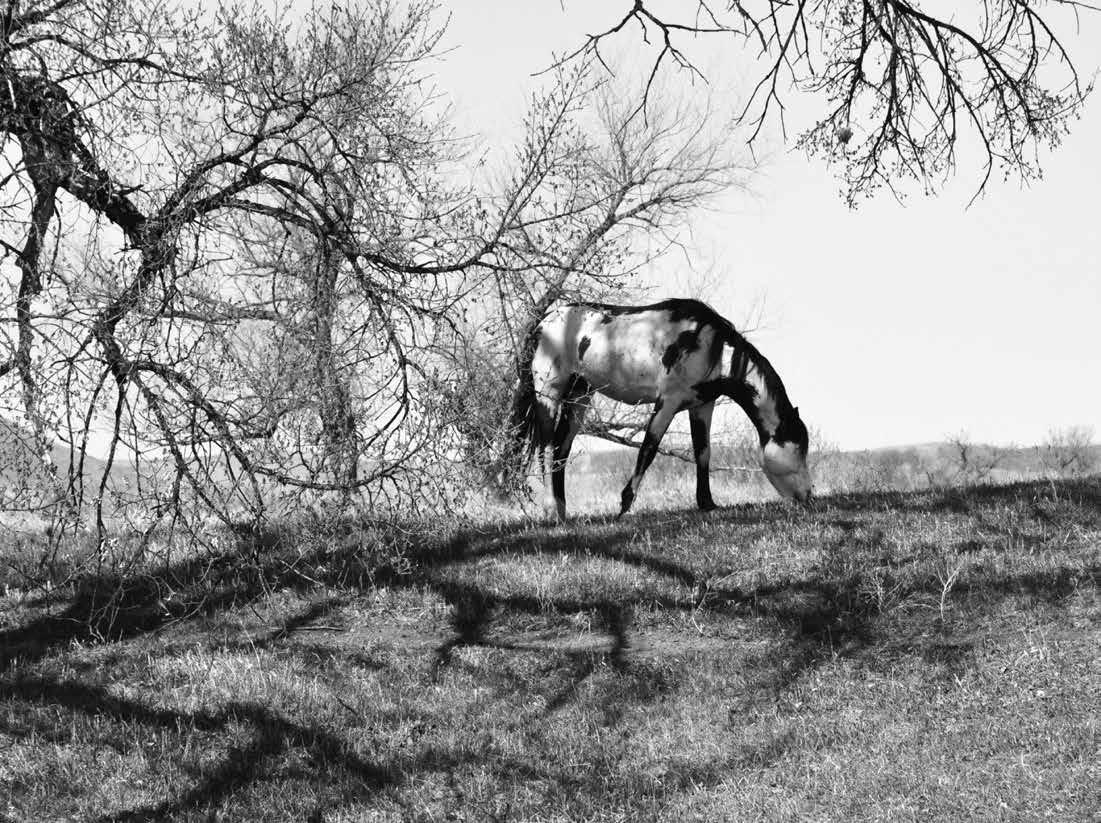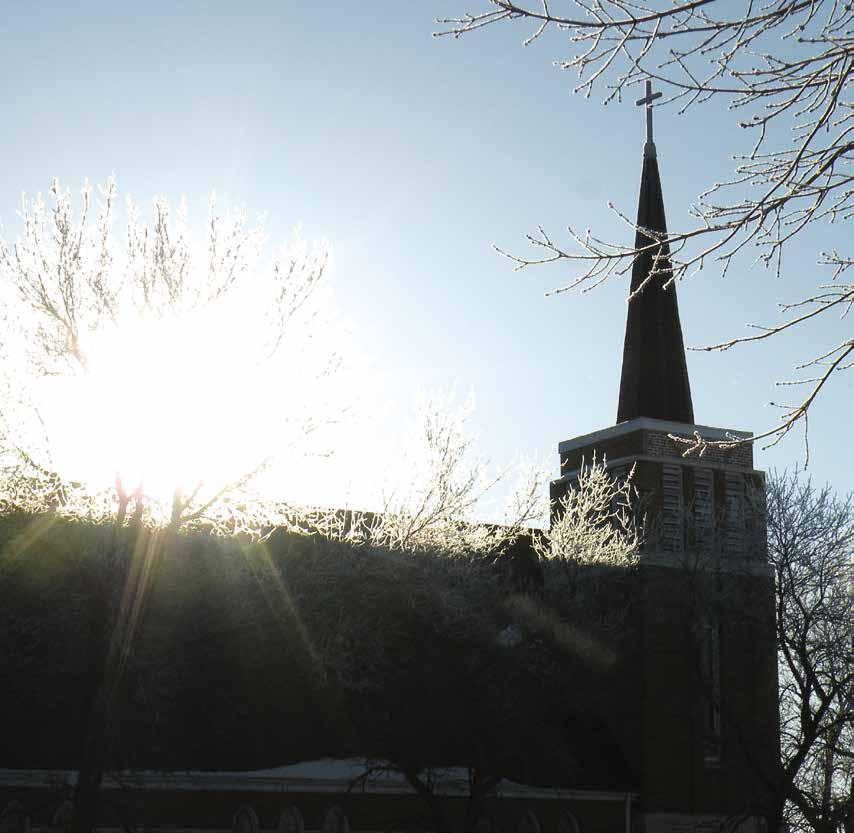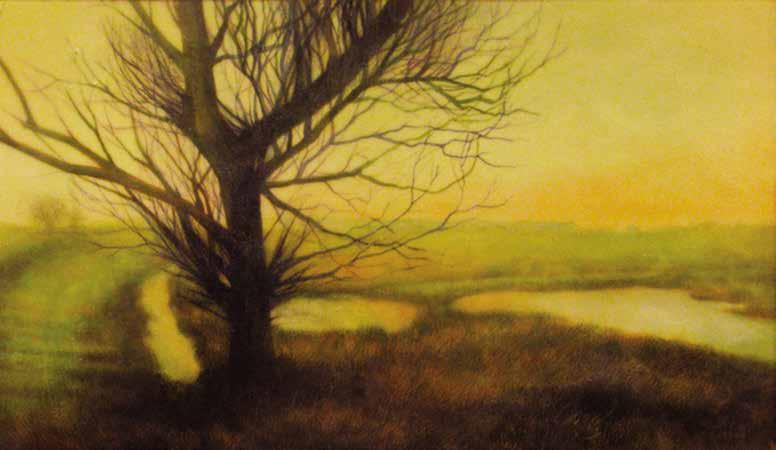
4 minute read
North Dakota Through a Poet’s Eyes: Poems by Bill Schneider
David Boggs,South Central Storm. Oil on linen, 36” x 36”
Bill Schneider has poems published in The Atlanta Review, The Southern Review, Northwest Review, Folio, and Cottonwood among others. He was the co-winner of the 2001 Grolier Poetry Prize and winner of the 2002 Kinloch Rivers Chapbook competition. He teaches writing and literature at Concordia College, Moorhead, MN.
Advertisement
BUS
By Bill Schneider
A man asks off at Island Park, steps down,
struggles over the snowplow bank
at the not-quite corner where we stop.
Then we rattle down the street, down
its furrowed tracks of graveled, salted ice.
An early moon floats behind the bare-limb trees
and street lamp crooks, above
the high dike hill rubbed slick
by tubes and boards kids slide down on.
I walked there on Saturday, frisky and fresh,
luxurious in the spring-like swelter, in the dry,
clear light we had that day, and I marveled at
the yellow hats and boots, the red canvas coats,
the bright green leggings, all the kids
trudging up, sliding down. It was hard though,
seeing kids like that, but it was the fathers
who got me most—on sleds behind,
or running down shouting watchitwatchit,
or the one who knelt in the snow to zip
a snowsuit leg, his child’s mittened hand
familiar at his neck. I’d like that too. I’d cherish
the zipping, linger long with it—to sense
that small hand—its familiarity, its balance
and trust. Then, sledding done, I would have shown
that kid the tunnels squirrels make
through deep park snow, or how
the river freezes above its bouldered falls
like a shell, and later, how I fix a pretty good
grilled cheese. But still, tonight, even without
those things, I feel fine—I do like buses—
moments inside that are just for seats, for
sitting down, for letting bus be bus,
and for the jouncing over ice and rut that shakes
a heart—for the pain that might slip out.
First published in Louisiana Literature
FEBRUARY CROWS
By Bill Schneider
The bus ride home—windows rimy, heater weak.
An early dusk, and dense, gray clouds.
Snow again tonight. And in the cold, in
the muted light, crows circling icy trees.
-
A stop at the Seniors Home, and a man
climbs on, his face crimped and blank
beneath a John Deere cap, coat snapped tight.
He stares at the puddled, rubber floor,
-
his fingers kneading thighs through faded denim,
his boot heels lifting, dropping, like a clock
wound low. Or a heart.
I get off soon after, and after stir-fry
-
and rice, and after washing up, I smooth
Dakota on the kitchen table, trace
the blue and the straight black lines
from Fargo out through flat and white
-
to Cando, Mohall, McClusky. I picture
homesteads battered and lost—A-frame, silo,
shed and gate—breached by snow and wind,
splintered white and dry like husks of sheep.
-
Later, in bed, warm, and blanket-heavy, that man
comes to me again and I think that if I’d
been him, on my way to Cash Wise or K-Mart,
or just on for the ride around, I—I hope—
-
would have pried a window open, or with
an elbow, or with the red axe beneath
the driver’s seat, smashed the window into little jabs
of shattered glass—no matter blood
-
or cops or cold snow drifting—then
mustered in those crows and commandeered
their purple-black and pounding wings
to fly me, fly me up, fly me back.
First published in Confluence
FARGO ELMER FUDD
By Bill Schneider
One of my students wrote
a poem about her father, and how, in a persistent
rage, he’d rigged shotguns to dispatch the rabbits
that were stripping his garden. At the time I thought,
well, that’s extreme, and too, I was a liberal
about the rights of rabbits. But then I bought
a house. And now, though I don’t grow vegetables,
and though I can’t name my hedge plants
to save my soul, or my flowers, except
the tulips I bought in Amsterdam, I don’t want
my nature eaten up around me. There are laws
in cities, even in Fargo, so I haven’t
bought a shotgun, though I did buy a trap.
But the door seemed tricky, and I’d’ve had
to have toted it, with the rabbits, far enough away
to discourage Peter-come-homes.
But, relax, you say, calm down. Why
so agitated? Why so shrill? Well, if rabbits
can eat with impunity, then anything,
everything can be eaten—my guitars could, or
my confidence, or my IRA, or my
Civic even (just last week the oil change guy said
I needed the injectors cleaned): the world
is at risk, nothing’s for sure. So I bought some
chicken wire, spent Saturday making
a little rabbit proof fence, a twelve-inch strip around
the bottom of the chain link out back. But after
a day of unrolling the wire, of snipping it
into long, tie-able strips—the snipped, sharp
ends pricking my hands and wrists like Sebastian’s,
and just as bloody—then twisting it tight
to the fence’s diamond squares, I realized—surprise—
that this is North Dakota, and that winter
would come. And if the snow is deep enough
again this year, and with a good strong crust on top
like last year, the rabbits will hop
across that snow and squeeze through the links
above my proof. And eat. Which is why I finally
understand: there is no hope, no future. I’m
being eaten alive, and I have been, all of my life.
First published in Wisconsin Review

